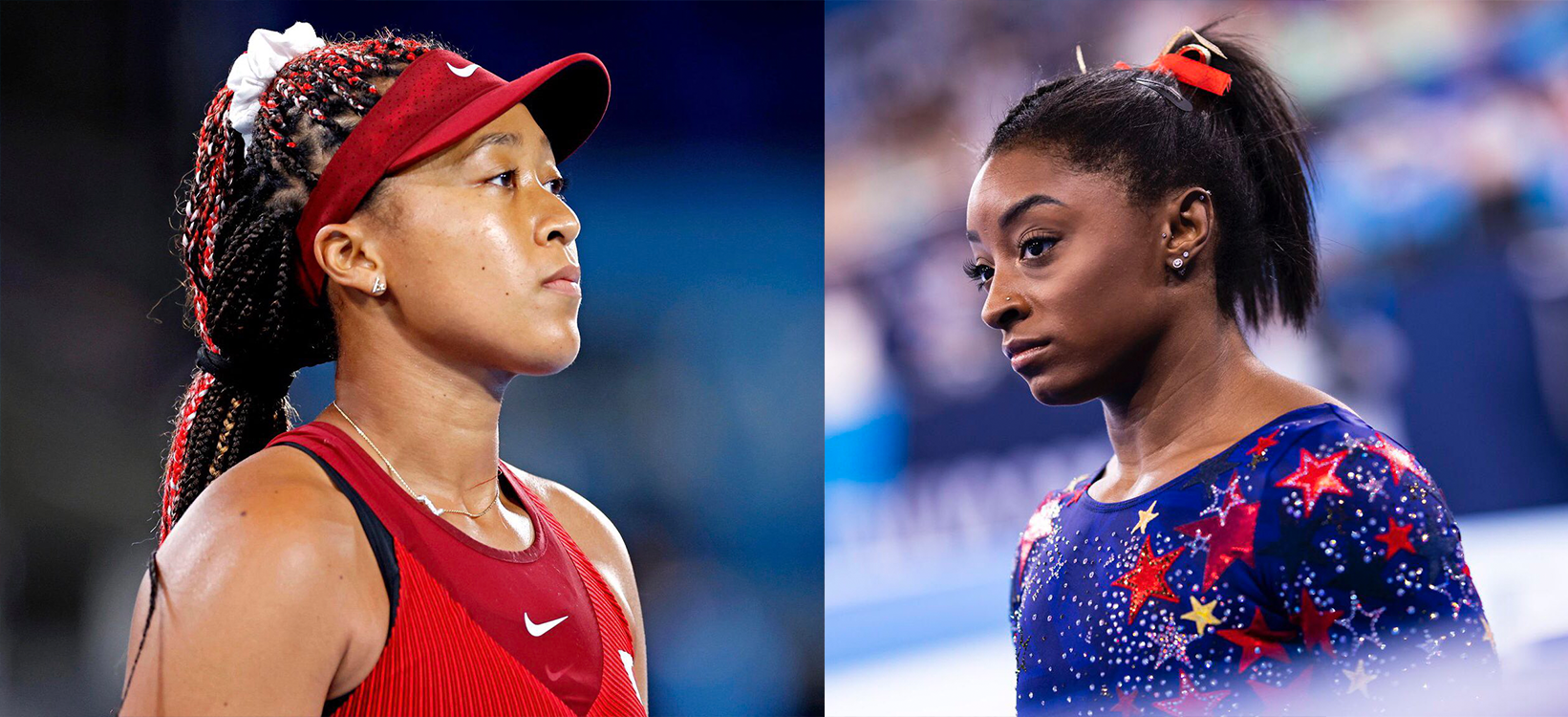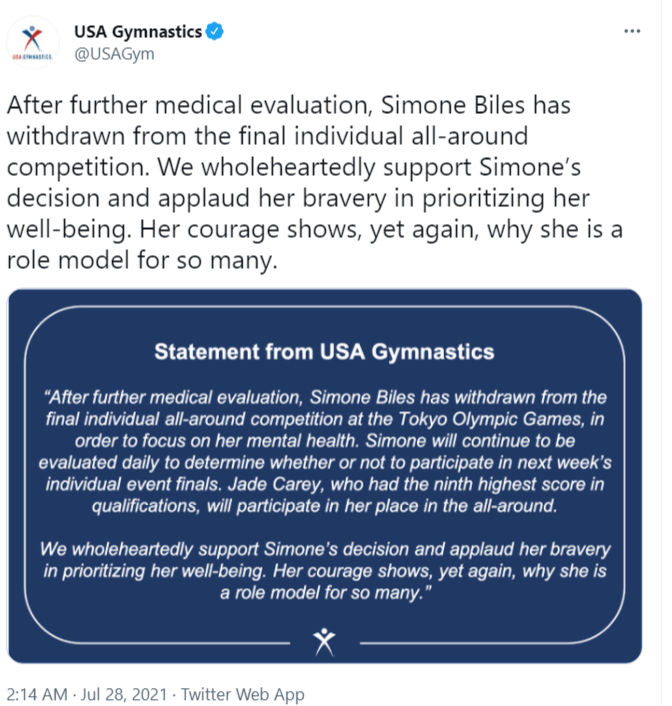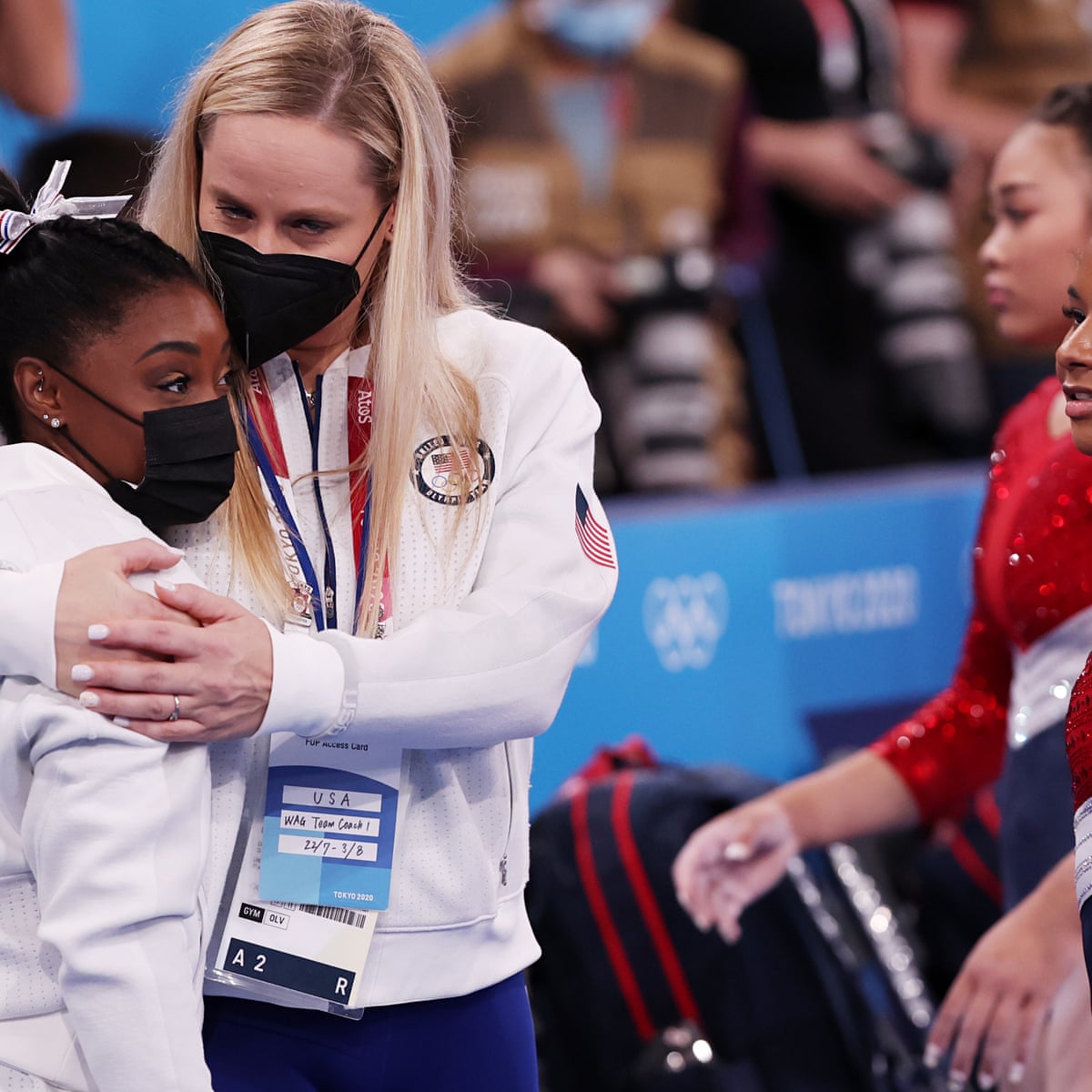
The Athlete Mental Health Revolution
July 30, 2021
US and world artistic gymnastics superstar Simone Biles' decision to withdraw from the Tokyo 2020 Women's Team Final last Tuesday has sparked a renewed and heated global conversation on the need to protect mental health first. Called the GOAT (greatest of all time) of the sport by many, Biles has a combined 30 Olympic World and Championship medals and performs at a difficulty level that has been unmatched for many years.
It is just because of her extremely high performance level, her typically machine-like consistency and the fact that it took place at an event considered the pinnacle of sport for many, that Biles' decision made the world take notice, reflecting what should be - priortization of mental health and personal safety over any competition, public perception or medals.
Her actions have sparked worldwide discussion and analysis, including huge praise and support for her courage in speaking out on the importance of preserving her mental health and the need to “protect our minds and our bodies” as “we are people at the end of the day.”
As stated in a recent Time magazine article on the subject: "Recognizing when you’re mentally not in the right state to compete is a key part of athletes being more aware of not just their body but their mind as well. And having a support team of coaches and teammates who recognize the importance of that is critical to ensuring that small mental struggles don’t balloon into larger ones that can be more debilitating."

This realization is becoming more and more common among high-performance athletes and the public, particularly as the world goes through the COVID-19 pandemic and its resulting traumas. UK football legend and Sporting Director of Angel City FC, Eniola Aluko reiterated this sentiment at our July Beyond Soccer event. Aluko explained that when it comes to these athletes, a lot is expected of them in terms of activism, connecting and inspiring, however, “people seem to forget that athletes are people too.”
Also contributing to Biles' experience is the astronomic global media attention, the added demands on her as a leader and the fact that she is the only active gymnast competing who is a survivor of Larry Nasser's sexual abuse. She has stated that she felt the need to continue competing because she doesn't feel that all parties will be properly held accountable if she doesn't.
“I truly feel do feel like I have the weight of the world on my shoulders at times. I know I brush it off and make it seem like pressure doesn’t affect me but damn sometimes it’s hard hhahaha! The Olympics is [sic] no joke!”
Biles is now taking it a day at a time for the remainder of the Games, but shared that it was tennis star Naomi Osaka - who withdrew from the French Open for mental health reasons earlier this year - who had inspired her to speak out about her own issues.
Osaka who has since been an advocate for mental health recently created a rare non-fungible token (NFT) which will be resold through an auction, with a proportion of net proceeds going to mental health awareness and support for athletes around the world. The donations will go to Athletes for Hope, which aims to bring together athletes to educate, inspire and empower them to make a difference in the world through sport philanthropy. The donation will be funneled directly to the non-profit's "Whole Being Athlete" program.
"I say put mental health first. Because if you don't, then you're not going to enjoy your sport and you're not going to succeed as much as you want to. So it's OK sometimes to even sit out the big competitions to focus on yourself because it shows how strong of a competitor and person that you really are — rather than just battle through it," said Biles.

Biles has been flooded with messages of support from fellow athletes, the public and notable figures who are also sharing their stories and calls for action.
"It broke my heart," retired US swimmer Michael Phelps told US broadcaster NBC. "But also, if you look at it, mental health over the last 18 months, is something that people are talking about."
Phelps, considered the greatest swimmer in history and the winner of 23 Olympic gold medals, has publicly discussed his own battle with depression, including contemplating suicide. He said that the Olympics is an event that comes with a lot of emotions and can at times be overwhelming.
"I think athletes and Olympic athletes in general ... we need someone who we can trust, somebody that can let us be ourselves and listen. Allow us to become vulnerable," said Phelps
This year, Osaka and now Biles have joined a group of elite athletes who have taken their mental health into their own hands and spoken openly about their struggles said NBC. Olympic sprinter, Noah Lyles has been a vocal advocate for mental health and wellbeing, sharing on social media that he takes anti-depressants and sees a therapist. Olympic track and field athlete, Raven Saunders was public about her breakdown and depression.
The empathy that these athletes received with their public struggles and decision to concentrate on their own mental health was in stark contrast to what Australian rower Sally Robbins experienced in the 2004 Olympic Games, where she withdrew due to anxiety. She was dubbed a “Lay-Down Sally” by one newspaper and was seen as a villain by her teammates.
Sebastian Coe, the president of World Athletics and a double Olympic champion, said he recognised the "profound challenges facing athletes" in trying to find the balance between training and sporting competitions and maintaining their wellbeing.
There has been some progress as the USOPC, which had typically focused on mental health support that targeted improved performance, hired a director of mental health to focus on the well-being and assess their athletes more consistently. The IOC also distributed a "mental health playbook" to athletes and their support staff for the first time at Tokyo 2020. It also plans to create a global registry of culturally relevant mental health professionals for athletes.
After Osaka pulled out of the French Open, Phelps told her that by speaking up, she may have saved a life. In reaction, she stated, "If that's true, then it was all worith it."
And as Osaka inspired her, hopefully Biles's actions will in turn save someone else's life and continue to underscore that we are all humans first, something that she has since come to realize: "The outpouring of love & support I've received has made me realize I'm more than my accomplishments and gymnastics which I never truly believed before."